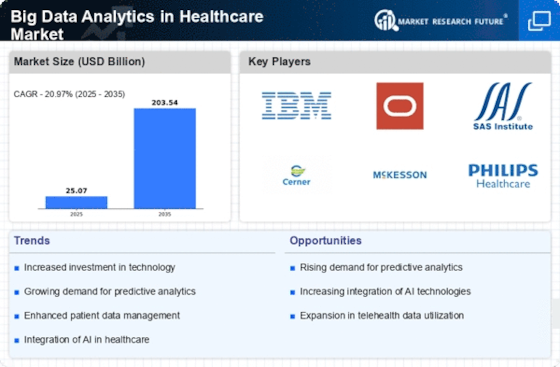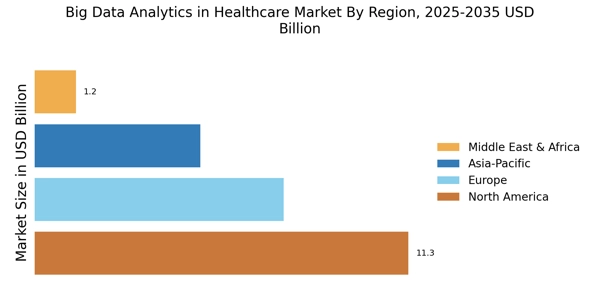Advancements in Technology
Technological advancements play a crucial role in shaping the Big Data Analytics in Healthcare Market. Innovations in artificial intelligence, machine learning, and cloud computing are enabling healthcare organizations to process and analyze large datasets more efficiently. For instance, the integration of AI algorithms in data analytics allows for more accurate predictions and personalized treatment plans. The market for healthcare analytics is expected to grow at a compound annual growth rate (CAGR) of approximately 23% from 2023 to 2030, driven by these technological enhancements. As healthcare providers adopt more sophisticated analytics tools, the potential for improved patient care and operational efficiencies becomes increasingly apparent, further stimulating market growth.
Integration of IoT in Healthcare
The integration of the Internet of Things (IoT) in healthcare is emerging as a pivotal driver for the Big Data Analytics in Healthcare Market. IoT devices generate vast amounts of data that can be analyzed to improve patient care and operational efficiency. The proliferation of wearable health devices and remote monitoring tools is contributing to the accumulation of real-time health data, which can be harnessed through big data analytics. It is estimated that the IoT in healthcare market will reach USD 188 billion by 2025, highlighting the potential for data analytics to transform patient monitoring and management. As healthcare providers increasingly adopt IoT solutions, the demand for analytics that can interpret this data will likely surge, further propelling market growth.
Regulatory Support and Initiatives
Regulatory support and initiatives are increasingly influencing the Big Data Analytics in Healthcare Market. Governments and regulatory bodies are recognizing the importance of data analytics in enhancing healthcare delivery and patient safety. Initiatives aimed at promoting the use of health information technology, such as the Health Information Technology for Economic and Clinical Health (HITECH) Act, encourage healthcare organizations to adopt data analytics solutions. This regulatory backing not only fosters innovation but also ensures that healthcare providers are equipped with the necessary tools to analyze data effectively. As a result, the market is likely to experience sustained growth, driven by favorable policies and funding opportunities that support the integration of big data analytics in healthcare.
Growing Focus on Preventive Healthcare
The growing focus on preventive healthcare is a significant driver for the Big Data Analytics in Healthcare Market. As healthcare systems shift from reactive to proactive approaches, the demand for analytics that can identify risk factors and predict health outcomes is increasing. Big data analytics enables healthcare providers to analyze patient data and identify trends that can lead to early interventions. This shift is reflected in the increasing investments in preventive care, which are projected to reach USD 100 billion by 2025. By leveraging big data analytics, healthcare organizations can enhance their preventive care strategies, ultimately improving patient health and reducing costs, thereby driving market growth.
Rising Demand for Data-Driven Decision Making
The increasing emphasis on data-driven decision making in the healthcare sector is a primary driver for the Big Data Analytics in Healthcare Market. Healthcare organizations are increasingly recognizing the value of data analytics in improving patient outcomes and operational efficiency. According to recent estimates, the healthcare analytics market is projected to reach USD 50 billion by 2026, indicating a robust growth trajectory. This demand is fueled by the need for actionable insights derived from vast amounts of healthcare data, which can enhance clinical decision-making and streamline processes. As healthcare providers seek to leverage data for better patient care, the adoption of big data analytics tools is likely to accelerate, thereby propelling the market forward.

















